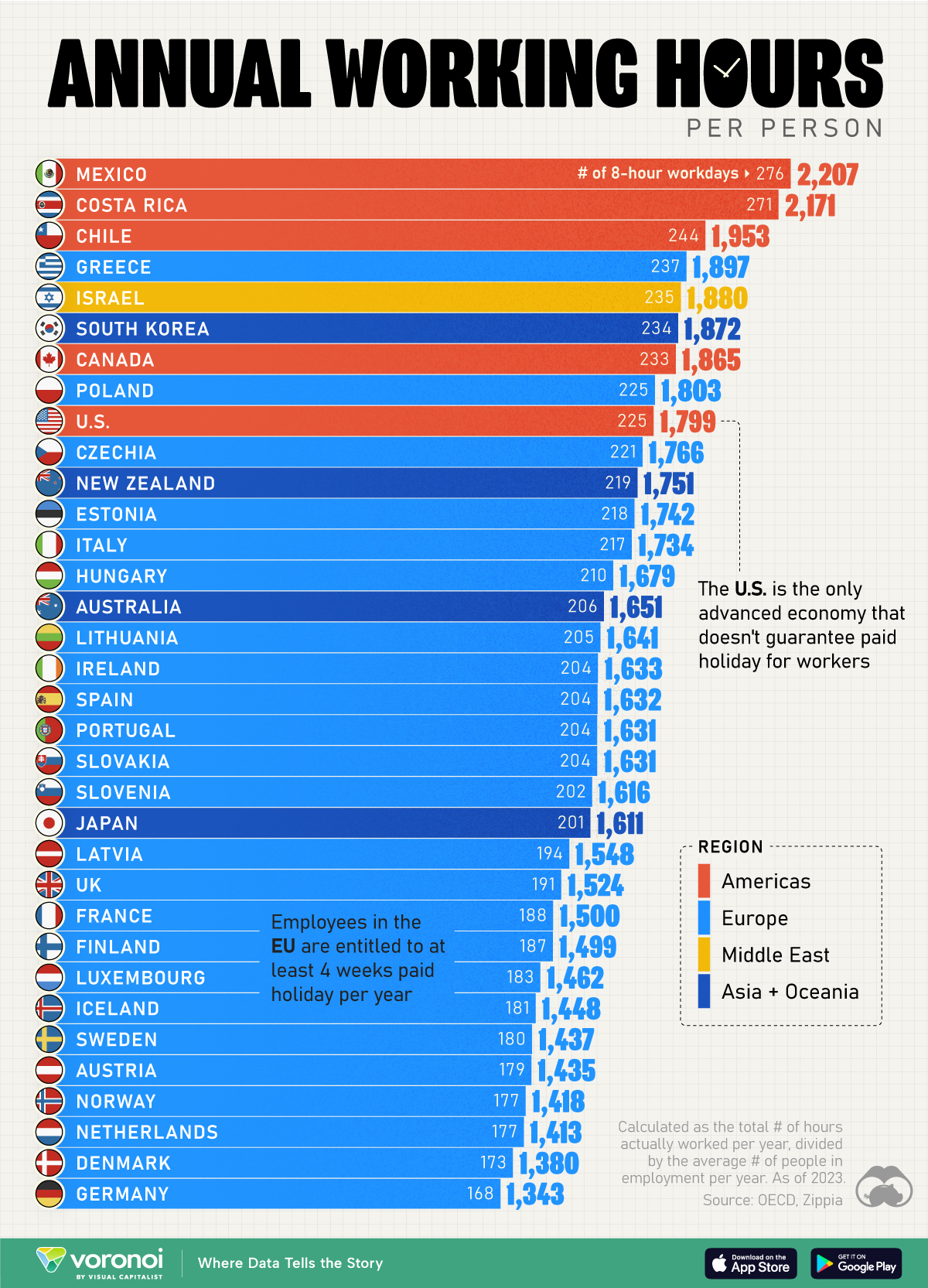Marcus Lu
2024-07-22 07:52:55
www.visualcapitalist.com
![]() See this visualization first on the Voronoi app.
See this visualization first on the Voronoi app.
Infographic: Average Working Hours by Country
This was originally posted on our Voronoi app. Download the app for free on iOS or Android and discover incredible data-driven charts from a variety of trusted sources.
Do you feel like you work too much? Curious about how long people work in other countries?
In this graphic, we’ve ranked OECD countries based on average working hours per year, as of 2023. It reveals a wide gap between the longest and shortest-working countries, to the tune of 864 hours (36 days).
Note that this data is based on the average number of people in employment in each country, meaning it includes full- and part-time workers.
Data and Key Takeaways
All figures were sourced from the OECD (Organisation for Economic Co-operation and Development), an international organization that promotes policies to improve economic and social well-being. It has 38 member countries, though in this instance, data for all of them was not available.
For additional context, hourly figures were also converted to the number of eight-hour workdays.
| Country | Annual Hours Worked per Person |
# of 8-hour Workdays |
|---|---|---|
 Mexico Mexico |
2207 | 276 |
 Costa Rica Costa Rica |
2171 | 271 |
 Chile Chile |
1953 | 244 |
 Greece Greece |
1897 | 237 |
 Israel Israel |
1880 | 235 |
 Korea Korea |
1872 | 234 |
 Canada Canada |
1865 | 233 |
 Poland Poland |
1803 | 225 |
 U.S. U.S. |
1799 | 225 |
 Czechia Czechia |
1766 | 221 |
 New Zealand New Zealand |
1751 | 219 |
 Estonia Estonia |
1742 | 218 |
 Italy Italy |
1734 | 217 |
 Hungary Hungary |
1679 | 210 |
 Australia Australia |
1651 | 206 |
 Lithuania Lithuania |
1641 | 205 |
 Ireland Ireland |
1633 | 204 |
 Spain Spain |
1632 | 204 |
 Portugal Portugal |
1631 | 204 |
 Slovakia Slovakia |
1631 | 204 |
 Slovenia Slovenia |
1616 | 202 |
 Japan Japan |
1611 | 201 |
 Latvia Latvia |
1548 | 194 |
 UK UK |
1524 | 191 |
 France France |
1500 | 188 |
 Finland Finland |
1499 | 187 |
 Luxembourg Luxembourg |
1462 | 183 |
 Iceland Iceland |
1448 | 181 |
 Sweden Sweden |
1437 | 180 |
 Austria Austria |
1435 | 179 |
 Norway Norway |
1418 | 177 |
 Netherlands Netherlands |
1413 | 177 |
 Denmark Denmark |
1380 | 173 |
 Germany Germany |
1343 | 168 |
At the top of this ranking are three countries from the Americas: Mexico, Costa Rica, and Chile.
This could be due to several reasons, including:
- Economic structure: Labor-intensive industries like agriculture play a large role in their economies
- Social policies: These countries may have less extensive social safety nets, meaning workers work more to compensate for the lack of government support
- Lower wages: Lower average wages in these countries can lead people to work longer hours to improve their living standards
At the lower end of this ranking are a large number of European countries, particularly those with advanced economies. It should be noted that in the European Union (EU), all employees are entitled to at least four weeks paid holiday per year.
This is a stark contrast from the U.S., which is the only advanced economy in the world that does not guarantee paid holiday for workers.
One major outlier in this dataset is Greece, which ranked fourth at 1,897 average annual hours. The country has been struggling to boost economic growth, and more than 500,000 people have left the country since its debt crisis in 2009.
It was recently announced that Greece would be allowing certain employers to introduce a six-day work week.
See More Graphics From Visual Capitalist
If you enjoyed this post, be sure to check out Ranked: The Cities with the Best Work-Life Balance in the World.
The post Ranked: Average Working Hours by Country appeared first on Visual Capitalist.
Source Link

































![Canon DSLR Camera [EOS 90D] with 18-135 is USM Lens | Built-in Wi-Fi, Bluetooth, DIGIC 8…](https://techcratic.com/wp-content/uploads/2024/11/71wFDlXt6L._AC_SL1500_-360x180.jpg)









![The Legend of Zelda: Majora's Mask Walkthrough – Part 31 [100%]](https://techcratic.com/wp-content/uploads/2024/11/1732774800_maxresdefault-360x180.jpg)


























